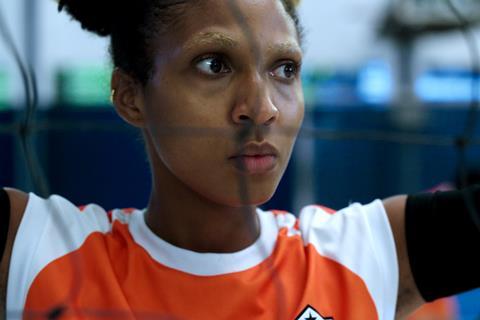This spirited debut on female reproductive rights in Brazil celebrates queer sisterhood

Dir: Lillah Halla. Brazil, France, Uruguay. 2023. 92mins.
A punchy, confrontational energy infuses this celebration of queer sisterhood in the face of Brazilian conservatism. Seventeen-year-old Sofia (Ayomi Domenica Dias) has everything going for her. A talented volleyball player, she is currently being courted by a scout who is offering her the chance of a sponsored scholarship in Chile, and is enjoying a budding relationship with teammate Bel (Loro Bardot). Sofia discovers, though, that she is pregnant. She plans to terminate the pregnancy but, in Brazil, abortion is a crime.
The delivery of the message is an emphatic slam dunk
Although somewhat didactic at times, this spirited feature debut from Lillah Halla is a vivid, dynamic piece of filmmaking driven by the sparky connections between the teammates and a terrific, pulsing electronic score. It’s the second time in Cannes for Halla, whose 2020 short film Menarca premiered in Critics’ Week and subsequently streamed on MUBI. With its intense, almost febrile sense of female bonding through sport, Power Alley has a kinship with the early scenes of Celine Sciamma’s Girlhood. Thematically, there are parallels with pictures like Eliza Hittman’s Never Rarely Sometimes Always and Audrey Diwan’s Happening, although Power Alley takes a markedly more aggressive and forthright approach to the all-too timely subject of female reproductive rights. The film should find a home at further film festivals, and may be of interest to distributors with a focus on LGBTQ+ themes and voices.
Sofia’s volleyball team is called C. Leste (short for Capao Leste, named after the gritty Sao Paulo neighbourhood where the team members live). The team is gender fluid – it contains at least one trans woman, and the women’s changing room sign has been altered so that it now reads “They”. C. Leste’s star player, Sofia, knows that without her, the team is unlikely to win the Youth Volleyball Contest – not only does she risk missing out on a life-changing opportunity because of the pregnancy, but she will also let her friends down.
She feels isolated and alone with this problem. Her mother is not in the picture, her father is caring and supportive but is preoccupied with trying to upload bee-keeping videos to YouTube and doesn’t notice, at first, that his daughter is closing herself away from the rest of the world. Deciding to take matters into her own hands, she finds an abortion clinic on the internet.
The woman who greets her at the clinic shows far too many teeth when she smiles. The doctor who performs an ultrasound remarks, “At this age, it already has eyelids, did you know?” But it’s not until Sofia catches the woman rifling through her backpack that she realises that something is very wrong. The ‘abortion clinic’ is a front for a fundamentalist group that uses any means necessary to prevent pregnancy terminations. And now that they have her details, Sofia faces a mounting campaign of intimidation.
The development of the relationship with Bel results in a few pacing issues – the propulsive tension of Sofia’s quandary is sidelined temporarily for a steamy romantic interlude that seems a little out of place within the story. And while the film’s conclusion is perhaps a little heavy-handed, the delivery of the message – of women’s reproductive rights and agency over their lives and bodies – is an emphatic slam dunk.
Production company: Arissas, Manjericao Filmes, In Vivo Films, Cimarron Cine
International sales: M-Appeal sales@m-appeal.com
Producers: Clarissa Guarilha, Rafaella Costa, Louise Bellicaud, Claire Charles-Gervais
Screenplay: María Elena Moran, Lillah Halla
Cinematography: Wilssa Esser
Editing: Eva Randolph
Production design: Maira Mesquita
Music: Maria Beraldo, with the participation of Badsista / Jucara Marcal
Main Cast: Ayomi Domenica Dias, Loro Bardot, Grace Passo, Glaucia Vandeveld, Romulo Braga
























